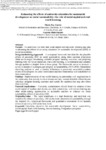Mostrar o rexistro simple do ítem
Enhancing the Effects of University Education for Sustainable Development on Social Sustainability: the Role of Social Capital and Real-World Learning
| dc.contributor.author | Rey-García, Marta | |
| dc.contributor.author | Mato-Santiso, Vanessa | |
| dc.date.accessioned | 2024-01-25T14:19:48Z | |
| dc.date.available | 2024-01-25T14:19:48Z | |
| dc.date.issued | 2020 | |
| dc.identifier.citation | Rey-Garcia, M. and Mato-Santiso, V. (2020), "Enhancing the effects of university education for sustainable development on social sustainability: the role of social capital and real-world learning", International Journal of Sustainability in Higher Education, Vol. 21 No. 7, pp. 1451-1476. https://doi.org/10.1108/IJSHE-02-2020-0063 | es_ES |
| dc.identifier.issn | 1467-6370 | |
| dc.identifier.uri | http://hdl.handle.net/2183/35147 | |
| dc.description | This version of the article has been accepted for publication, after peer review, but is not the Version of Record and does not reflect post-acceptance improvements, or any corrections. The Version of Record is available online at: https://doi.org/10.1108/IJSHE-02-2020-0063 | es_ES |
| dc.description.abstract | [Abstract] Purpose: The purpose of this paper is to understand the roles that social capital and real-world learning may play in enhancing the effects of university education for sustainable development (ESD) on social sustainability. Design/methodology/approach: A conceptual framework that identifies the plausible effects of university ESD on social sustainability along three outcome dimensions (think-act-leverage), broadening desirable program learning outcomes and proposing enabling roles for social capital and real-world learning, is substantiated and validated through qualitative insights from a focus group. The framework serves to structure a survey to alumni of a postgraduate program in sustainability (2011–2018). Hierarchical clustering analysis is used to identify differences in perceived, sustainability-related effects of the program on direct beneficiaries and their relationship with stakeholders in their communities. Findings: Implementation of real-world learning in partnership with organizations in the community that actively involves alumni not only extends desirable effects beyond individual program learning outcomes and outside the academia but may also renew them over time. Practical implications: University administrators should foster the creation of new social capital of students and alumni and their commitment with service learning and other credit-bearing opportunities as actionable enablers to enhance the social sustainability effects of university ESD. Originality/value: The paper contributes to a dual theoretical and empirical void related to the effects of university ESD on the social dimension of sustainability through the proposal of a conceptual framework and quantitative assessment of the dynamic effects of university ESD at the local level. | es_ES |
| dc.language.iso | eng | es_ES |
| dc.publisher | Emerald | es_ES |
| dc.relation.isversionof | https://doi.org/10.1108/IJSHE-02-2020-0063 | |
| dc.relation.uri | https://doi.org/10.1108/IJSHE-02-2020-0063 | es_ES |
| dc.rights | © 2020, Emerald Publishing Limited. This AAM is provided for your own personal use only. It may not be used for resale, reprinting, systematic distribution, emailing, or for any other commercial purpose without the permission of the publisher. | es_ES |
| dc.subject | University education for sustainable development | es_ES |
| dc.subject | Social sustainability | es_ES |
| dc.subject | Social capital | es_ES |
| dc.subject | Real-world learning | es_ES |
| dc.subject | Service-learning | es_ES |
| dc.subject | Postgraduate programs | es_ES |
| dc.title | Enhancing the Effects of University Education for Sustainable Development on Social Sustainability: the Role of Social Capital and Real-World Learning | es_ES |
| dc.type | info:eu-repo/semantics/article | es_ES |
| dc.rights.access | info:eu-repo/semantics/openAccess | es_ES |
| UDC.journalTitle | International Journal of Sustainability in Higher Education | es_ES |
| UDC.volume | 21 | es_ES |
| UDC.issue | 7 | es_ES |
| UDC.startPage | 1451 | es_ES |
| UDC.endPage | 1476 | es_ES |
| dc.identifier.doi | https://doi.org/10.1108/IJSHE-02-2020-0063 |
Ficheiros no ítem
Este ítem aparece na(s) seguinte(s) colección(s)
-
GI-C+D - Artigos [116]






